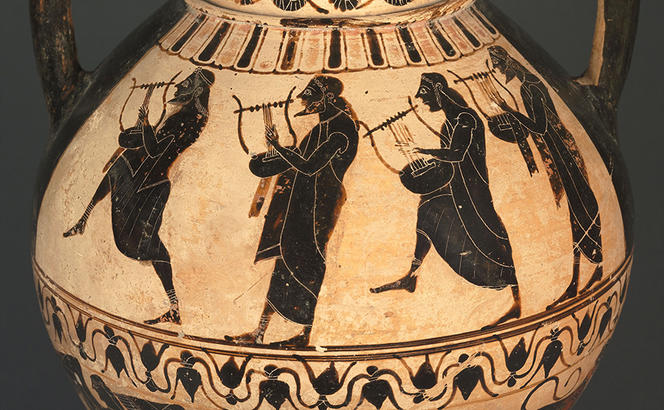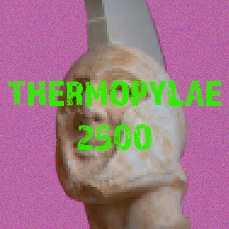[Lyre players Eturia, 560-550 BCE_Lewandowski2021]
Interviewee: Dr. James Lloyd-Jones, Interviewer: Bunny Waring.
Date: 5th March 2021
Welcome to the Classic Department’s series What’s it Like? During these episodes staff, volunteers and students who specialise in all fields of Classics, Archaeology and Museums, will share with you the realities of their jobs. What to be a Linguist? Museum Curator? Archaeologist? Lecturer? Well Travelled Researcher? A Barrier-Breaker? Have No Idea? Then read on!
This week: Dr James Lloyd-Jones
A Specialist in Ancient Music and Song.
Name: Dr James Lloyd-Jones.
Area of Specialism: A mix of Archaeology, Ancient history, and Museums.
Topics of Interest: Ancient music and musical instruments; the archaeology and history of Sparta.
Job Title: Sessional Lecturer.
Job Responsibilities: I teach lectures, seminars for a range of modules, as well as some ancient Greek language classes.
Introduction
I got my BA and MA from the University of Exeter and came to Reading in 2015 to do my PhD, supervised by Ian Rutherford. At the moment, I’m at a point where I’m finishing off research directly connected to my PhD and starting down new research avenues. This means looking at getting my first book published and applying for postdoctoral positions.
 [Dr. Lloyd Jones with research in hand, 2019.]
[Dr. Lloyd Jones with research in hand, 2019.]
What is your daily life really like?
On Monday mornings I print off a weekly timetable and start blocking out time. As an hourly-paid member of staff, my days a pretty flexible and they benefit from being as clearly structured as possible. This means some days will be focused on planning and preparing lectures and classes, and replying to student messages, and others will be focused on research, or writing job and research applications (postdoctoral applications normally range from 10-20 pages, so they need to be planned out well in advance of any deadlines). A typical day’s research might include reading scholarship, analysis of ancient evidence, or writing, editing, and revising articles for submission. There’s also normally a fair about of tea or coffee.
 [Attic vase with Symposium scene from 490 BCE, Louvre 2021.]
[Attic vase with Symposium scene from 490 BCE, Louvre 2021.]
For me, research can be really varied. One day I might be looking at an archaic Greek song, and figuring out how it should be translated, or how to interpret its performative context. I might also spend time collating lists of pottery with specific iconographies and seeing if there are any trends over time, location, or artist that appear. Other days might bring study visits to museums. The museum I’m most often in is of course the university’s own Ure Museum of Greek Archaeology. There’s a host of material relevant to my research interests in its collections. A few months before the first lockdown I spent some time in the Museum of London photographing and measuring Romano-British musical instruments in their collection, which was very exciting. That was really the beginning of a now somewhat halted project on music in Roman Britain. I’m also making my way through an MIT OpenCourseWare module on Music Perception and Cognition since I’m keen to learn more about the science of music.
[Musical fragment on papyri from the play Orestes by Euripides.]
What is the best part of your job?
In my current position, there is a great deal of flexibility. I research what I want to research, and I get to teach modules that feed into my research interests too. It is pretty great. It also helps to have a brilliant group of colleagues in the department too.
Why do you think your specialism is important?
The last two years I’ve been getting more interested in ancient music, so I’ll focus on that. There’s a lot that we don’t know about music. For Darwin, human musicality was one of the biggest mysteries of evolution. The earliest discovered musical instruments date to around 43,000 years before present. There’s this huge history of humans creating music, yet, until the last few decades, the importance of music throughout history has been largely overlooked. For Classics, it wasn’t until around the 80s that academics began to seriously turn to music as a subject of interest. Yet the Iliad and Odyssey of Homer were originally sung as songs, so too the surviving tragedies and comedies of Classical Athens. Studying ancient Greek and Roman music enriches our understanding of the past and allows us to interpret key moments of ancient Greek and Roman life more fully and correctly.
 [2nd Century CE fresco of Roman woman playing the kithara, Boscoreale.]
[2nd Century CE fresco of Roman woman playing the kithara, Boscoreale.]
If you didn’t have your current job, what else could you apply your skills to?
As an hourly member of staff, there’s already a few other things that I do freelance when time allows. One of those is learning design (I spent a fair bit of time in the summer helping converting modules to be delivered remotely). The other is writing about the past for non-academic audiences. A job that involved a mix of those things, and some kind of research, would be quite rewarding, I think.
Did you always want to be what you are today?
My defining memory of being interested in the past is a Year 3 school trip to an exhibition on ancient Egypt at the Birmingham Museum and Art Gallery. I think I even put that in my UCAS application, and while it sounds somewhat made up, I entered an associated art competition and came runner-up, winning a (largely unused) skateboard. To enter my felt-tip penned self-portrait of me peering into a display that housed a section from a book of the dead, I dragged my mum back into the museum (this was the 90s, so no digital entries) and we got a jacket potato and can of pop in the museum café. I’m still fascinated with how we look at the past, and how the past can influence and inspire us today.
 [The Cylix of Apollo with the chelys (tortoise-shell) lyre, on a 5th century BCE drinking kylix cup, Fingalo 2021]
[The Cylix of Apollo with the chelys (tortoise-shell) lyre, on a 5th century BCE drinking kylix cup, Fingalo 2021]
Where do you hope to be in 5 years time?
I’d like to be either near the end of a postdoctoral position, or starting something a bit more permanent. In terms of research and teaching, I’d like to be starting a project that looked at the archaeology of music on a global scale, and perhaps doing more teaching about the archaeology of music. But the academic job market is pretty brutal. As long as I was doing something that allowed me have a garden where I could grow some herbs, chillies, and sunflowers, I’d be quite content.
What 3 tips would you give to someone who wants to follow a similar path?
1) Do the research that you find most interesting (you’ll be up at night reading pages of densely written academic prose, the only way to get through that is if you’re genuinely interested in the topic)
2) Someone recently told me that you should always look at your research and ask “So what? Why does this matter?”. As brutal as that question can sometimes appear, you need to be able to answer it.
3) Collaboration, discussion, and networking are where you can find some of the most interesting and inspiring ideas.
What to know more?
If you’re interested in staying up-to-date with what I’m up to, I keep a semiregular blog at https://jameslloydclassics.wordpress.com/ .







